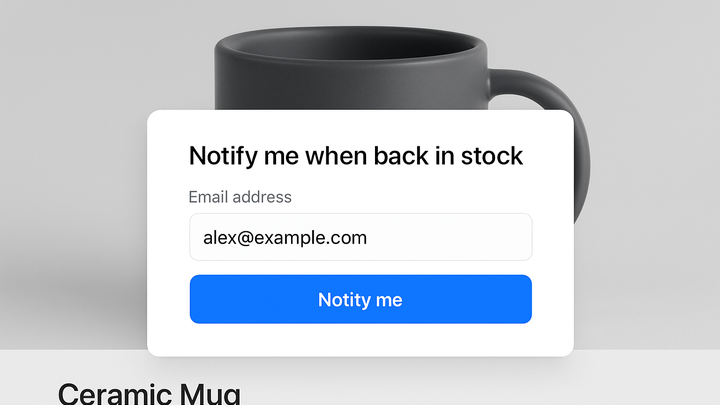Published on 2025-06-29T22:00:03Z
What Are Product Page Stock Alerts? Examples of Stock Alert Features
Product Page Stock Alerts are notifications that inform customers when an out-of-stock or low-stock item becomes available again. They typically appear on e-commerce product pages as sign-up forms or pop-ups, allowing users to submit their email or phone number to receive restock alerts. By engaging visitors at the moment they encounter inventory issues, these alerts transform potential frustration into actionable leads and opportunities for conversion.
From a CRO and UX perspective, they reduce bounce rates, build email lists, and leverage scarcity to boost sales. Thoughtful implementation also enhances SEO—through relevant schema markup and new user-generated content—and ensures accessibility for all visitors. Integrations like Prevue.me make it easy to deploy customizable widgets, track engagement metrics, and continuously optimize alert performance.
Product page stock alerts
Notifications on product pages that let users sign up for restock updates, boosting UX, CRO, and lead generation.
Why Product Page Stock Alerts Matter
Stock alerts address the frustration of encountering out-of-stock products by turning a dead end into a future opportunity. They keep customers engaged, reduce bounce rates, and capture leads at a critical moment in the purchasing journey.
-
Enhancing user engagement
Offering restock notifications keeps visitors invested in your site even when items are unavailable.
- Reduced bounce rates:
Users are less likely to leave immediately if they know they’ll be notified when stock returns.
- Increased return visits:
Alert emails bring customers back to your site, raising the probability of a purchase.
- Reduced bounce rates:
-
Leveraging fomo
Low-stock indicators and alerts tap into scarcity psychology, motivating users to stay informed and act quickly.
- Psychological impact:
Scarcity heightens perceived value and pushes faster decision-making.
- Urgency signals:
Displaying stock levels (e.g., “Only 1 left in stock”) intensifies desire to sign up.
- Psychological impact:
Impact on CRO and Lead Generation
Stock alerts serve as a powerful CRO tactic by converting potential lost sales into opt-in leads, feeding your broader marketing funnel.
-
Capturing lost sales opportunities
When a product is unavailable, alerts ensure you can still engage interested customers rather than losing them permanently.
-
Building your email list
Every alert sign-up is a permission-based lead entry, enabling targeted email campaigns and remarketing.
SEO and Accessibility Best Practices
Properly implemented stock alerts can enhance SEO through schema markup and new content, while ensuring alerts are accessible keeps your site inclusive.
-
Seo benefits
Alert sign-up forms can generate user-submitted content and support schema (e.g.,
ProductAvailability), boosting search visibility. -
Accessibility considerations
Ensure alerts are keyboard-navigable, screen-reader friendly, and meet color-contrast standards to serve all users.
Implementing Stock Alerts with Prevue.me
prevue.me streamlines restock alert deployment while providing CRO, lead generation, SEO, UX, and accessibility critiques. Follow these steps to integrate:
-
Integration steps
- Sign up for prevue.me and add your site.
- Customize your restock alert widget in the dashboard.
- Embed the widget script on your product pages:
<script src="https://prevue.me/widget.js" async></script> -
Leveraging prevue.me insights
Use prevue.me’s actionable critiques to monitor engagement metrics, optimize alert timing and messaging, and iterate on UX improvements.
Best Practices and Common Pitfalls
Adhering to design best practices and avoiding overuse ensures your stock alerts drive value without annoying users.
-
Clear call-to-action
Use concise, action-oriented text (e.g., “Notify me when available”) and distinct button styling.
-
Personalization and segmentation
Allow customers to specify variants or sizes and segment alerts for more relevant outreach.
-
Avoiding notification fatigue
Limit alert frequency, provide unsubscribe options, and respect user preferences to maintain trust.
